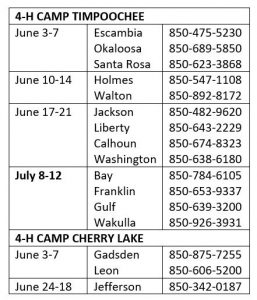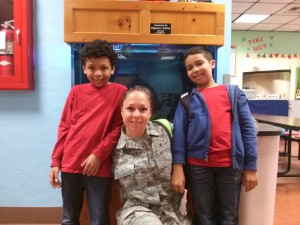by pmdavis | Nov 10, 2020

Courtesy photo from https://media.defense.gov
When you think of military service, what words come to mind … training, deployments, relocation, freedom, service, and sacrifice? One word that most people overlook is… Family! According to National Child and Traumatic Stress Network “November was first declared as Military Family Month in 1996. Since then, November has been a time to acknowledge the tremendous sacrifices our military families make. They contend with separation from their families and make adjustments to new living situations and communities. Military Families embody strength, resilience, and courage. Care of military families and children sustains our fighting force, and strengthens the health, security, and safety of our nation’s families and communities.”
Help 4-H recognize the Military Family this month. Many of us live in a community with active duty military families, and almost every community has a Guard or Reserve family that you may not realize are service members. These individuals have a different job in the community and serve in times of need.
For those of us without a military background, it can be difficult to know how to be supportive. You may want to meet military family’s needs but don’t know where to begin. Therefore, we have put together a few ideas to help you on your supportive journey.
- Create something decorative to cheer up a veteran’s nursing home room. Picture, Mandala, Bookmark
- If you have a new military family come to your community welcome them to the neighborhood or school. Help them find their way around, give them a list of best places in your community and your phone number in case they need help.
- Leave a care package with family friendly activities and self-care items. Operation Gratitude and Operation Care & Comfort are two organizations that do this for military members.
- Volunteer to babysit or take a child to a practice and give the military parent a break especially if one of the parents is deployed. Just having someone they can trust offer help is a big gift!
- Volunteer your time to provide companionship, serve a meal, assemble holiday packages. Veterans’ advantage has a list of trusted organizations and nonprofits if you don’t have a person in mind.
- Deliver a meal or prepare something that they can take from the freezer and put in the oven or microwave as a quick meal.
- Send a thank you note expressing your appreciation for the family’s support of our Military.
- Offer to cut grass, clean, or help with household chores.
- Offer to run errands – doing a grocery run, picking up dry cleaning, and other errands can ease the burden of juggling responsibilities while a military member is deployed.
- Adopt a family for the holidays. Holidays can be hard when a service member is deployed or doesn’t have family in the local area. Include military families in your holiday plans – holiday dinners, festivals, baking, etc. If you do not have a family locally Soldier Angels can help you to adopt a family.
- Treat a service member or veteran to a holiday stocking filled with items to bring them some cheer. If you don’t have someone in your local area, Soldiers Angels Stockings For Heroes is a national organization doing this. https://soldiersangels.org/holiday-stockings-for-heroes/
- Offer to board a military family’s pet while the family goes on vacation or takes a trip. Dogs on Deployment or PACT Military Foster Program
- Donate to local or national military support programs or gift your airline miles to Hero Miles Program. It supports wounded, injured, and ill service members and/or their families who are undergoing treatment at a medical facility.
We hope you and your family will consider doing something to recognize our military families this month. Also, if you have a family with kids, take them to visit a war memorial and discuss the meaning of service and sacrifice, and that this is something to remind us of the people who served in and died as a result of war. Help them understand the sacrifices of our military families to make our lives better and ensure our basic freedoms. I have been told by friends who are military families that even the “little things” can make a big difference to a military family. Please join us in celebration of National Military Families Month by adopting or supporting a military friend or support organization in 2020.
Written by Jennifer Sims and Paula Davis
by Melanie Taylor | May 1, 2019

Making friends at 4-H Camp in the early 1990’s (Melanie Taylor, Gulf County 4-H Agent, on right)
4-H Summer Camp preparations are in full swing all over the state. As a 4-H agent preparing for our week of county 4-H camp, my days are busy with phone calls and emails from parents, teen counselor training, adult volunteer screenings, paperwork, paperwork and more paperwork. Although it’s busy time for me as a 4-H agent, it also allows me to reflect why I chose this career path and why there is a sense of nostalgia as I prepare for 4-H camp.
Camp Memories
I grew up in Virginia and attended 4-H camp every year from age 9-18. I was a camper that grew into a counselor-in-training and then a full-fledged counselor. Those weeks of 4-H camp were filled with hot days and warm nights, but it was worth it all for the memories I’ll have for a lifetime. I can still smell the cafeteria food and hear the sounds in the gymnasium as kids played basketball and pounded at their leather-craft projects. I still get the chills when I think about our entire camp singing around the campfire circle and patiently waiting for a canoe, filled with camp staff, to land on the lakes edge. The staff would enter the campfire circle carrying the flame and ceremoniously light the fire. I’m still connected with my 4-H camp friends through social media and/or as close friends, and we continue to share our old, blurry camp pictures from the 1990’s each year on Facebook.

Memories to Last a Lifetime…
This is why I work hard to prepare camp for my county campers and teen counselors – I want to create similar memories for them. In 10, 20 or 30 years from now, I want them to think back on the fun moments they experienced in the Florida 4-H camping program. I want them to form friendships and make camp connections for a lifetime, whether it’s learning to kayak, fish, making arts and crafts, cooking over a campfire, singing camp songs and much more.
With all of this said, I hope you as parents will consider giving your child(ren) these special moments. The days are long, but fun, and nights are filled with campfires and hanging out with friends. When they arrive home on Friday, they’ll be exhausted but so excited to share all of the camp songs with you (prepare yourself for lots of loud, enthusiastic singing). They’ll have new friends they want you to meet and tell you camp stories they’ll always cherish.
When is Your County Camping?
In northwest Florida, there are two 4-H Camps:
4-H Camp Timpoochee in Niceville and 4-H Camp Cherry Lake in Madison.
Each county in these camping districts has one week of camp each summer.  Contact your local UF/IFAS Extension Office now
Contact your local UF/IFAS Extension Office now
to find out the details and register your child for a week of fun and memories!
by Melanie Taylor | Jan 11, 2019

Be mindful and enjoy the moment.
Now that the busy holiday season is over, it’s a time to reflect on the past but prepare and refocus for the new year ahead. As we focus on the new year, it is always refreshing to have a clean slate. As the year begins to unfold, there are tips to help you manage your day-to-day stress levels. It begins with mindfulness.
What is mindfulness?
Mindfulness means paying attention in a particular way; on purpose, in the present moment, and non-judgmentally.” Dr. Jon Kabat-Zinn (1991)
Mindfulness is best thought of as a way of being rather than an activity Almost any activity can be carried out with mindful awareness.
Three Key Features of Mindful Awareness:
- Purpose – intentionally and purposefully directing your attention rather than letting it wander.
- Presence – being fully engaged with and attentive to the present moment. Thoughts about the past and future that arise are recognized simply as thoughts occurring in the present.
- Acceptance – being non-judgmental toward whatever arises in the moment. This means that sensations, thoughts, and emotions are not judged as good or bad, pleasant or unpleasant; they are simply noticed as “happening” and observed until they eventually pass (Naik, Harris and Forthun 2016).
Mindfulness is a mind-body practice that has been found to benefit both psychological and physical health. The primary psychological change that occurs during mindfulness practice is an increased awareness of thoughts, feelings, and sensations in the present moment. Over time, mindfulness practice can help you to become aware of the space between noticing experiences and reacting to them by letting you slow down and observe the processes of your mind (Black 2010).
The ultimate goal of mindfulness practice is for you to take advantage of this space so you can make more intentional decisions – to wake up from living life on autopilot, based on unproductive habits of mind
(Black 2010; Walach et al. 2007).
According to the American Psychological Association, some empirically supported benefits of mindfulness include the following (Davis & Hayes 2011):
Psychological Benefits
- Increased awareness of one’s mind
- Significantly reduced stress, anxiety, and negative emotions
- Increased control over ruminative thinking (a major cause and symptom of depression and anxiety)
- Increased mental flexibility and focus
- More working memory
- Decreased distracting thoughts
- Decreased emotional reactivity
- Increased capacity for intentional, responsive behaviors
- Increased empathy, compassion and conscientiousness of other’s emotions
Physiological Benefits
- Enhanced immune system functioning
- Increased brain density and neural integration in areas responsible for positive emotions, self-regulation, and long-term planning
- Lowered blood pressure
- Lowered levels of blood cortisol (a major stress hormone)
- Greater resistance to stress-related illnesses such as heart disease
Spiritual Benefits
- Increased self-insight and self-acceptance
- Increased acceptance of others
- Increased compassion and empathy
- Increased sense of morality, intuition, and courage to change
- Increased control over automatic behaviors
- Increased self-discipline
The question is, how many of us would like to benefit from mindfulness if it provides these positive benefits? All of us should strive to lower our stress level and enjoy our daily lives with a more positive attitude and more attentiveness. So, how can we incorporate this into our lives? The majority of this practice is about familiarizing yourself with what it feels like to be mindful, and getting better at “remembering” to maintain mindful awareness.
Experiment with creating your own mindfulness practices throughout your day. Being mindful of the sensation on the soles of your feet as you walk to your car or the taste and texture of your morning coffee can transform routine moments into deeply satisfying practices. However, having a ritualized and structured practice can be beneficial. To find out more about practicing mindfulness and how to incorporate a more structured practice in your life visit read Mindfulness: An Introduction.
Sources: Mindfulness: An Introduction. 2013, 2016. Retrieved from the UF/IFAS Extension Electronic Data Information System: https://edis.ifas.ufl.edu/fy1381. Publication #FCS2335
by Melanie Taylor | Dec 14, 2018

Aim to find JOY in this holiday season.
As the holiday season quickly approaches, many people are filled with extra holiday cheer and enthusiasm. Some are jolly but still overwhelmed with all of the activities, decorating, and shopping that needs to be completed. Then, there are those that find the holiday season as a reminder of things such as the death of a loved one, family feuds, divorce…the list goes on. If you are feeling this way, here are a few tips to make getting through the season a little bit easier.
- Feel your emotions – Many people want to suppress their sadness or anxiety, but this only makes it worse. We are all allowed to grieve, cry and feel mad at times. If you feel this way, let yourself feel your feelings. You will feel better once you have accepted and worked through the emotions. You also do not have to force yourself to feel happy just because it is the holiday season.
- Reach out to others – Instead of secluding yourself, spend time with others whether it’s at church, a community group or with family and friends. Spending time with others and socializing is good for the spirit.
- Volunteer – There are tons of volunteer opportunities during the holidays. Try something new and volunteer your time to a worthy cause. You’ll feel great about helping others and contributing to a cause.A national survey commissioned by UnitedHealth Group talked to 3,351 adults and found the majority of participants reported feeling mentally and physically healthier after a volunteer experience.
The research showed:
* 96% reported volunteering enriched their sense of purpose in life
* 94% of people said volunteering improved their mood
* 80% of them feel like they have control over their health
* 78% of them said volunteering lowered their stress levels
* 76% of people said volunteering has made them feel healthier
* About a quarter reported their volunteer work helped them manage a chronic illness by keeping them
active and taking their minds off of their own problems
* Volunteering improved their mood and self-esteem
- Be realistic – Realize that times and traditions change as families grow and age. Do not focus on things having to be the same every year. Be willing to accept changes, such as adult children may not be able to attend the family gathering, so utilize technology and talk through video conferencing, share pictures on email and/or Facebook. Find a way to make it work.
- Set aside differences for everyone’s sake. Aim to accept family and friends the way they are, even if they do not meet your expectations. Leave grievances at the door for the day and enjoy your family and friends. Share those grievances and talk at a more appropriate and private time. Also, remember they could be feeling the stress of the holiday too. So, be patient if someone is grouchy or sad as you celebrate. You may both be feeling the same way.
- Learn to say no – Be realistic in the number of activities you and your family can participate. Do not feel guilty because you cannot attend every party and event you are invited too. Graciously decline an invite and share that your schedule is booked, but thank them for thinking of you. A host does not expect that everyone will attend their parties.
- Take a breather as needed – If you start to feel overwhelmed with anxiety, anger or sadness take a few minutes to be alone. Take 15 minutes to spend in the quiet to reduce the stress and clear your mind. For example: listen to soothing music, do a few mindful breathing exercises to slow yourself down or read a book to temporarily escape the stress.
- Seek professional help as needed – there are times when the emotions are just too overwhelming to sort through on our own. If you continue to feel sad, anxious, angry, etc. there is absolutely no shame in seeking the help of a doctor or mental health professional. It will only help you work through your feelings with a non-bias person. Helping yourself feel better will improve your quality of life and those around you.
Learn to take care of yourself first. Learn your limitations and accept them. Don’t t let other’s expectations overwhelm you. Just remember when you start feeling extreme levels of emotions and/or stress, take a few deep breathes and remind yourself to relax and feel the moment. Be mindful of your surroundings and remind yourself of your many blessings even when going through difficult times. Make it your personal goal to feel your feelings and enjoy what you can about the holiday season whether it is the twinkling lights, time with friends and family, the food or any of the many special holiday traditions.
Striving for and maintaining a healthy lifestyle is an achievable goal and a National 4-H Council mission mandate for all of our 4-H members, families and volunteers. To learn more about healthy lifestyles and 4-H, find your local UF/IFAS Extension office.
Sources:
by pmdavis | Apr 1, 2016

Show military youth that you care- wear purple on April 8th!
April is the Month of The Military Child! When we think of honoring our military, we often think of Memorial Day and Veterans Day. Did you know there is also a time identified to honor our youngest heroes, military children? Since 1986, April has been designated Month of the Military Child. This allows us to honor military children and their families for their commitment and sacrifice. In Florida we have over 51,000 military youth who deal with situations like having their parents in harm’s way when they deploy. Most people think of the color green when they think of 4-H, but on April 8th, 4-H youth and volunteers in Florida will be sporting the color purple to show support for our military families.
Imagine if someone close to you were deployed. Would you like to see all the news reports showing bombs exploding and people shooting at each other? How would you feel about having long and repeated separations when your parent misses important events like birthdays, holidays, school and sporting events? Would you like it if your family had frequent relocations/moves? Every time families move, children have to make new friends, get used to new schools, and find new 4-H clubs and teams to join.
A lot of military children take these changes in stride and some even thrive on them, but it is also hard – kids have to rebuild their world every time they move. UF/IFAS Extension and 4-H are proud to be a part of the military family working with youth centers across the nation to have some consistency for youth in these situations and who are making these moves.
Here locally we want you to join us in showing your support and to celebrate our young heroes! Participate in the 6th annual Purple Up! For Military Kids. Wear purple on Friday, April 8th, as a visible way to show support and thank military children for their strength and sacrifices. Why purple? Purple is the color that symbolizes all branches of the military, as it is the combination of Army green, Coast Guard blue, Air Force blue, Marine red and Navy blue.
The goal is for our military youth to see the support of their community. Please join us in honoring these young heroes as we Purple Up! For Military Kids on April 8th! Be creative….the goal is for military youth to see the support in their school, youth groups, and the community! If you don’t have or own a purple shirt wear a purple ribbon, tie, headband etc. Just show your support and let our youth know we care about them! Can’t make the 8th then do something another day in April. We would like to encourage you to take pictures of your group wearing purple and share them on social media. If you are willing to share then e-mail them to us.:bay@ifas.ufl.edu or post photos to Facebook and tag us https://www.facebook.com/bayifas/ or comment and add your photo.







